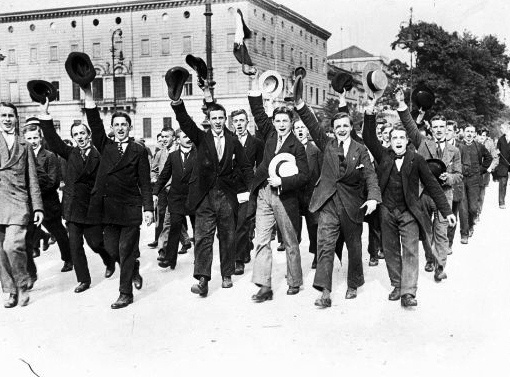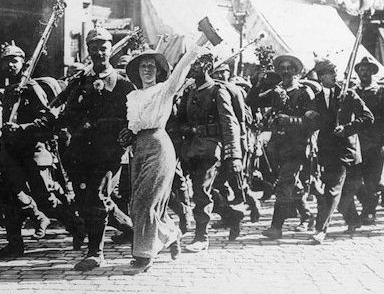First World War Enthusiasm in July and August of 1914 and few weeks immediate after. Depicted in the population of few states and according to their perspectives for upcoming war.
General enthusiasm of whole nations in the first months after mobilisations and final commence of the First World War is one of these moments in history which has few comparisons to itself. As it can be seen in many publications from that era by prominent and less prominent persons with positions in science, governance and authority, the events of July and August 1914 were rather unequivocally seen as a final relief and a moment of rejoicing for whole states and societies. It is true that there is not much experience in the social fabric of societies which unify people so broadly as the moment of finding a common enemy and the struggle against outside force or power. But the spirit of those first few months in 1914 is special in every respect.
In this short paper I will try to depict the emotions and views of the public among European Powers in conflict which later got the name La Grande Guerra. To do that I will use sources like text of General Friedrich von Bernhardi Germany and The Next War, few articles of Bertrand Russell coming from around this period and general knowledge of the era.
Just by reading of Bernhardi work the reader gets the notion of the overwhelming role which war and struggle played in the minds of people who observed those events. In his book, Bernhardi comes out from the position of peace. Though generally he does agree that peace is a noble idea that should be valued, as through peace economy and stability can be protected and society order upheld, he immediately goes to show that only war can harden the internal vitality of the nation. The war will strengthen those nations which are internally solid and which have been built on though ground of common nationality. Common service in military is not only striving of nation against external dangers but also the internal ones and against internal enemies. The text of Bernhardi is showing how far the general knowledge of social Darwinism went. When Bernhardi talks about how the struggle of one nation, which is totally immersed in war (meaning an effort of whole society, technology, workforce, etc.), he claims that such a war is the most important to later hold the longer peace. That is because war is not only: a struggle for existence of nations, but also: a natural law, law guided by nature for eliminating what is decadent and praising what is internally alive, but needs only purification. War eliminates what was to die on its own. That is visible in the fact that even if some confederation of weaker states succeeds in winning for some time it simply cannot win over ethnically consistent nation.

Students in Berlin cheer the declaration of war in August 1914
This text shows how social, racial, cultural and ethnical Darwinism has been slowly boiling into political Darwinism used to justify the war and later prolong the war effort of nation states. In the new era of more omnipresent and new medias, of penny press and silent films, diplomacyhas gained new and powerful ways of leading public opinion in accordance to its needs.
Prior to the beginning of the war, political Darwinism had made war not only a viable option for protecting peace but also just a measure of strength. As Bernhardi writes it is possible to have peaceful struggle, but peaceful competition never will show real pecking order and that will only cause more problems in the future. As individuals in the pack need a leader also nations need clear Power on European stage to ward off any conflict and to make judgements between countries.
Additionally we have to take heed also of the two new secular religions of late long 19th century. This is first of all nationalism about which we have been talking. How far that passion went in societies is visible clearly in Berthard Russell's and Bernhardi's texts which just overflow with phrases like: nationality, nation building, nation, national. Socialism has become the second and almost equal force. Social ideas of 19th century, competition of workforce in first-time global scale trade, moreover general trade, made Great Britain lose its unique feature. Dominance in the second industrial period started to be slowly moving in the direction of Germany and United States. That ominous presence of nationalism was first time shown in reactions towards the start of the war. The atmosphere of rejoicing with the final decision to start was of course spearheaded by such changes as the growing number of people unemployed who would happily change their life stance, but it was much more than that. It was the real hope in people, the thought that it can resolve conflicts inside European societies. That war can bring important changes, like more work abilities, but also more social provisions. All of it was just strengthened by the idea of each and every country's society that it was the real Power which is defending its own territories. In the era of general atavism, of fin de siècle pessimism and atheistic views, people hoped that war would again make societies vibrant and alive.
In the months after beginning of hostilities, patriotism run high inside of most European societies. Due to general peace preceding in Europe for long decades or at most volatile moments just short periods of war manoeuvres seemed to be rather a glorious occurrence. Short and not so mortal fight of conflicting ideologies and points of view. Every nation had had its very own explanation as to way this war has to be fought. Britain fought for democracy and liberty against regime and oppression of German-Prussian military dehumanized machine. Though in reality provisions of social standing in Germany were much higher than for most of British people. One of Bismarck's ideas was to fight socialism by socialising the state instead of letting it overthrow monarchy and the state itself. Incorporating instead of fighting. Limits on working hours would be introduced in Britain only after the war and in Germany were at its high in the 90s of the previous century. Germany fought for withholding status quo after Franco-Prussian war of 1871 and against Russian barbarism and for a place in colonial and European superpower. France wanted to deem itself able to brake materialism and decadence of its own, to revise borders set and imposed on her in 1871 and from fear of stopping German nationalism and German population growth which was overshadowing whole France. Like Erich von Falkenhayn wrote in 1912: Europe was bored, bored of long peace on scale unseen before, striving for new wonderful future, future that only war can bring. The Austro-Hungarian Empire wanted to save its own territory and to save it, it could not go any further in conceding its central power to other internal bodies of smaller nations in this stew of ethnicities it hold at time. Dum spiro spero and some in Austria hoped to save what it had by showing off resolve to not give up on anything more. A war was to bring superiority to some states, prosperity for others and for others reaction and stopping the problems at home. Russia after the lost Japan war and after its own revolution of 1905 was not only sure tertium non datur in the view of saving its own predated system, but also hoped that war would bring important developments and capital for them after the war for general industrialisation. That was even more erroneous when we check out the data covered in a book of Jurgen Osterhammer who rightfully pointed out that had there been no war in 1914 for Russia, it could really hope for speeding up its properly beginning industrialisation. This fact is often omitted but the third fastest growing economy of Powers (after naturally United States and Germany) after 1901 and before 1914 was Russia.
Social Darwinism, a child of many and among them Herbert Spencer, was the dominating literature of political science since 1860s. Many forget that the famous phrase survival of the fittest was firstly created to describe not the evolution of organism like in 1859 Charles Darwin's piece, but the relations among nation-states. The general atmosphere of the laissez-faire of fin de siècle provoked in many the desire for a grievous change, of restoring old morals, of imperialism without consequences. But also the cult of highest authorities of the countries involved in war effort. The era of Romanticism also gave its own interpretation to this new struggle, of ancient past of Nordic pan-Germanism, of fearless warriors of the past. In the Eastern Europe the Hungarian minority in its own part of Empire was again feeling threatened by pan-Slavism of mostly Slavic nations dominating in this fifty-something million state, with only around then millions of Hungarians out of thirty millions population of Saint Stephen Crown. Young Turks wanted to proceed with their own interpretation of the Turkish state and at first to revise all losses to European Powers in the previous century. The sultan instead wanted to bind the Turkish nation with itself and pan-Arabic powers feeling down-trodden by incursions made by Italians and French and Brits inside of their territory. Osmaniches Reich wanted to recreate its own vitality also by the popular use of religion. What is more absurd, it was even a thing which German advisors were encouraging Turkish officers to do and to maintain imams inside army brigades. But that role of religion wasn't solitary confined to the Osman Empire. The Russian Tsardom also very successfully incorporated the orthodox faith into its own propaganda machine.

Germans marched to war with flowers in their rifles or stuck between their top buttons of their tunics
Newspapers played a very important role as new and ubiquitous means of sharing nation-wide feelings. It is rather extraordinary that in first months of war every piece of daily information started to matter, no matter if it was information coming from the press inside or outside the country; but it started to be seen as a propaganda. For the German literature we have also a problem connected with conquests and colonisation. As Berhardi writes: The right of conquest is universally acknowledged. He justifies such view due to the fact of which French are scared the most, id est that a nation which has the biggest surplus of the population has the moral high ground of conquer from the same reason as in case of colonisation, the lower are changed by the most developed and rest goes into oblivion: The right of colonization is also recognized. Vast territories inhabited by uncivilized masses are occupied by more highly civilized States, and made subject to their rule. Higher civilization and the correspondingly greater power are the foundations of the right to annexation. Strong, healthy, and flourishing nations increase in numbers. From a given moment they require a continual expansion of their frontiers, they require new territory for the accommodation of their surplus population. Since almost every part of the globe is inhabited, new territory must, as a rule, be obtained at the cost of its possessors--that is to say, by conquest, which thus becomes a law of necessity.
Volumes of course of the jubilatory atmosphere speak the fact of public acclamations during messes around the Europe in every country in July 1914th. Be it the famous spirit of 1914 also called: Augusterlebnis of whole Germany and Austria-Hungary in Wien, Berlin, Munich, Hamburg or London Trafalgar's Square for Britain. Just recalling a word of a young Austrian, Adolf Hitler on Odeonplatz in Munich is enough to see how frantically people reacted. Bertrand Russell was horrified after seeing how normal people delightfully reacted to the news of general mobilisation. Civilians throwing hats in the air, long speeches and popular concerts thrown for the sake of celebrating the upcoming war. In Britain most interested in war was the working class, but it was not exclusive for Albion. It was a general view of socialist parties in Europe, all parties connected to SPD in Germany rejoiced at the beginning of the war. Every country of course used every possibility of supporting the cause of the war in days after its outbreak. But Germany particularly was known — even after its Augusterlebnis -of consolidating all authorities inside Zweite Reich for the support of war. One of such occurrences of not even inspired by official political line of Empire was so called Manifesto of the Ninety-Three. It was signed by the most prominent persons of art, science, design, industry and such; an acclamation of ubiquitous and unrelenting support for the German cause and German rights in October of 1914 to debunk even such obvious fact that it was Germans who entered Belgium and published to at least seemingly decline the importance of so called rape of Belgium and become a part of the propaganda; but new kind of one propaganda for war from inside the country, not from the parliament (Reichstag) but from people from authority other than that the public, not from the government: As representatives of German Science and Art, we hereby protest to the civilized world against the lies and calumnies with which our enemies are endeavoring to stain the honor of Germany in her hard struggle for existence-in a struggle that has been forced on her. (Manifesto of ninty-three)
All of that shows how enormous was the support for war in every country in Europe and in every class and strata of their societies.
Bibliography:
· German and the next war, Friedrich Bernhardi, New York 1914.
· Before the War, Viscount Haldane, London 1920.
· Niemieckie naczelne dowództwo w latach 1914-1916, Erich Falkenhayn, Warszawa 1926.
· World War I. A History, Hew Strachan, Oxford 1998.
· The Ethics of War, Bertrand Russell, New York 1915.
· Why Men Fight, Bertrand Russell, New York 1916.
Adam Pawłowski Student historii UW i pracownik Muzeum Wojska Polskiego. Religiosceptyk, z zamiłowaniem do fizyki teoretycznej i geopolityki, amator psychologii ewolucyjnej i kofeiny. Student historii UW i pracownik Muzeum Wojska Polskiego. Religiosceptyk, z zamiłowaniem do fizyki teoretycznej i geopolityki, amator psychologii ewolucyjnej i kofeiny.Liczba tekstów na portalu: 17 Pokaż inne teksty autora |
Oryginał.. (http://www.racjonalista.pl/kk.php/s,10036)
(Ostatnia zmiana: 07-09-2016)